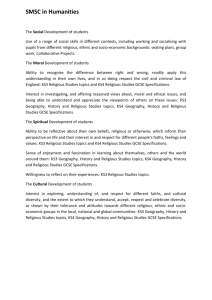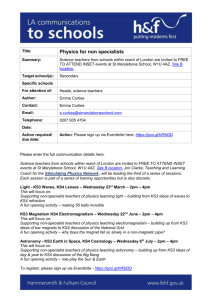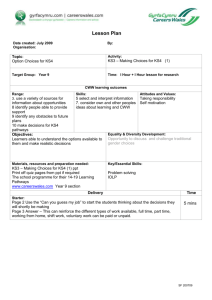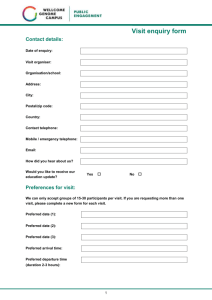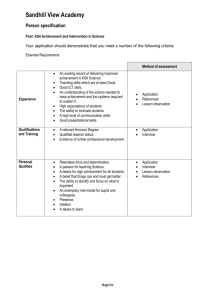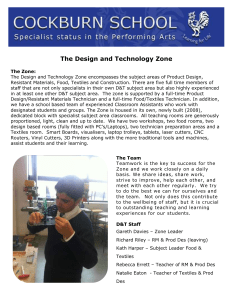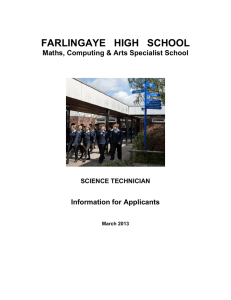Panel session 2
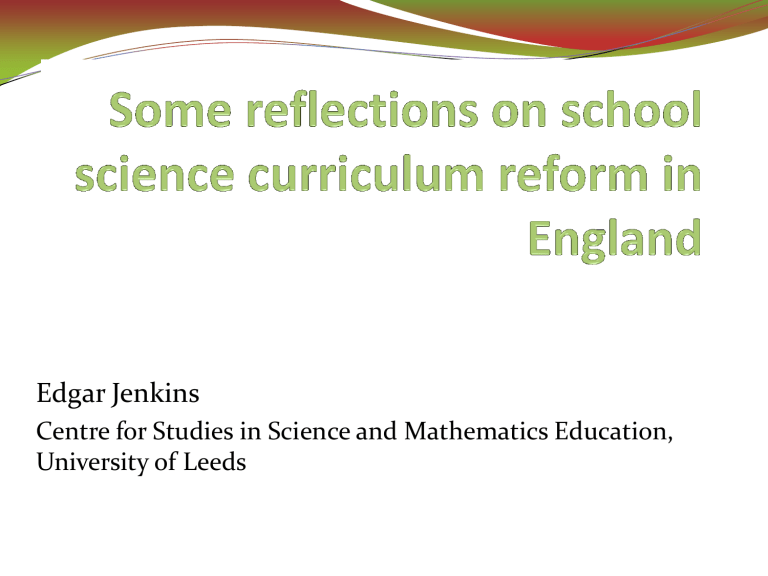
Edgar Jenkins
Centre for Studies in Science and Mathematics Education,
University of Leeds
More science is being taught to more students than at any time in history
More students are studying the separate sciences at GCSE level
The worse may be over in terms of falling Alevel entries in physics and chemistry
The overall performance of 15 year olds in England in PISA 2006 was better than most of the other 30
OECD countries, although less good than those in
Finland, Canada, Japan, New Zealand , Australia and the Netherlands
Student performance sensitive to the instrument used to measure it
School performance standards in England vary considerably
Science teaching is supported by a very wide but uncoordinated range of STEM activities
Ambassador schemes, taster courses, SET weeks, webbased activities, prizes, awards, competitions, podcasts, national and regional science centres, institutions of higher education, professional societies concerned with science and science education
Hands-on museums now part of a global industry to promote public understanding of, and engagement with, science
Rapid growth in the coverage of science in the print and broadcast media
Hawking, Sagan, Dawkins, Atkins, Lederman, Davies, Wolpert. Moore,
Attenborough, Feynman etc.
Emphasis on inquiry-based approaches to teaching designed to enhance students’ interest in science and improve their learning
‘The future of Europe depends on a renewed pedagogy’ (European Commission 2007)
Students’ views of science are generally very positive, although more so in developing countries than in the industrialised world.
By focusing on ‘how science works, are we:
ignoring important differences between the sciences?
narrowing students’ perception of the many roles that the sciences play in the modern world?
under-emphasising the role that creativity and imagination play in scientific investigation?
missing an opportunity to indicate to students what is not yet known and why this is so?
Should we be satisfied with the way in which
‘How science works’ is being interpreted?
Is there a risk of science becoming an inadequate background against which students discuss issues that are essentially ethical, political or economic and where the underpinning science is difficult and complex?
If school science is being redefined, we need to recast the work of science teachers by equipping them to deal with issues characterised by controversy, uncertainty, ethical dilemmas, subjectivity
Many attempts to reform school science reflect:
an assumption that the school science curriculum is overloaded with facts and this makes the sciences boring
a belief that it is important to create a space within the curriculum for students to exercise independence and judgement, a space judged to be lacking in traditional science courses
Narrow the gap between the best and worst levels of attainment
Address issues of gender, ethnic and other imbalance
Encourage more students from state schools to study physics in higher education
Exploit ways in which modern electronic means of communication can enrich the science curriculum and transform students’ learning
Make much more use of assessment for learning and encourage students to monitor their own progress
Help students see ‘science’ as a creative and imaginative activity that plays many roles in the modern world
Bring school science into closer contact with sciencebased activities in the wider community beyond school or college
Raise the standards of science teaching to the highest possible level and remove any obstacles that prevent or hinder this
Choose the right people to become teachers
Develop them into effective teachers who teach consistently well
Establish systems and targeted support to ensure that every student is able to benefit from excellent teaching .
McKinsey & Co. 2007.
Secondary Science Curriculum: a Northern
Ireland perspective
SCORE
Royal Society
Feb 2010
Dr Colette Murphy
School of Education
Queen’s University
Belfast
N. Ireland
CONTRIBUTORS
I would like to acknowledge the expertise of all university and school colleagues who helped in the preparation of this talk, including:
Mr Simon Bell
Dr Ruth Jarman
Dr Karen Kerr
Mrs Maura McGrath
Mr Miguel Robinson
Mrs Pamela Thomlinson
•Queen‟s University Belfast
•Victoria College Belfast (science specialist school)
•Ballymena Academy
Overview: science in the NI curriculum
1. Introduction - secondary school science
2. NI Curriculum policy - 20 years of change
3. Science in the revised NI curriculum
4. Experiencing science in the revised curriculum: schools and initial teacher education
Traditional school science - a sense frame?
The world of science very few links some links
Science and everyday experience
School science potential links
Science and other learning
Making sense of school science lessons
The world of science
LINKS developed by policy-makers, curriculum developers and teachers
NI - 2/10
NI - 5/10
School science
LINKS developed by policy-makers, curriculum developers and teachers
LINKS -
NI - 5/10 developed by policy-makers, curriculum developers and teachers
Science and everyday experience Science and other learning
Science in the NI curriculum: pendulum swings…
• 20 years ago most pupils studied science to 14
• Introduction of the NI common curriculum (1991) compulsory science to 16
• Revised NI curriculum (2007) science optional after 14
Science in the revised NI curriculum at KS4
• Statutory requirements at KS4:
– develop the cross curricular skills (Communication, Using
Mathematics and Using ICT);
– develop the other skills, defined as Problem-Solving, Self
Management and Working with Others;
– Learning for Life and Work;
– PE; and
– RE, based on the core syllabus specified by DE.
Areas of learning at Key Stage 4
Areas of Learning
1. Language and Literacy
2. Mathematics and Numeracy
3. Modern Languages
4. The Arts
5. Environment and Society
6. Science and Technology
7. Learning for Life and Work
Contributory Elements
Employability
Local and Global Citizenship
Personal Development
8. Physical Education
GCSEs General Science
Applied science (double award)
Science (double award)
Science (single award)
Science (entry level)
GCSE Sciences
Biology
Chemistry
Physics
GCSE Technology
Technology and design
Technology and design (entry level)
STEM-NI (2009) report on the science curriculum
Conclusion 8 – Need Greater Support for Primary Curriculum
• too many pupils develop negative attitudes to science and practical and investigative approaches are underdeveloped.
• the “ World Around Us ” has the potential to make science more relevant and exciting, but many primary teachers may lack the knowledge, skills and confidence to deliver an appropriate science and technology programme
Conclusion 9 – Need greater curricular coordination for STEM
• little joint planning between primary and postprimary schools in the STEM subjects , leading to repetition and insufficient emphasis on the relevance of STEM at a time which many consider to be critical in forming a child‟s interest.
Conclusion 15 – Major decline in STEM subjects at A Level
• Physics, further mathematics and computer studies continue to decline at A-level.
Conclusion 18 – Narrow base of STEM schools offering A-levels
• 20% of the schools account for 70% of the entries - these are all selective schools.
Experiencing revised curriculum science
Positives
Potential to make better links between school science, other subjects and the world outside school
Scope to relate school science more closely to student interests ; student engagement and encouragement to choose science at KS4 becomes a priority
Pupils enjoy science more , according to evaluation sheets, participation and verbal feedback
More time for less content; inclusion of more investigative, interesting and relevant science
Teachers can decide HOW and WHY to teach particular
KS3 topics; opens up professional dialogue
More scope for teacher choice ; potential to reduce repetition of KS3 content at KS4
Removal of KS3 tests allows a more flexible approach
Stronger links with primary schools and industry
Increased and more varied use of ICT in science lessons
Issues
Notably large gap in NI between highest and lowest achievers in science (PISA 2006)
Legacy of prescriptive curriculum and choice for teachers to carry on „doing what they did before
New KS3 / KS4 transition issues , eg contentheavy and „difficult‟ KS4 science
Temptation to start teaching KS4 science during
KS3 to prepare students for GCSE
Lack of good courses at KS4 for those who cannot cope with the rigour of GCSE science
‟ Choice to „give up‟ science after KS3
Matching TSPC with science content
Lip-service being paid to WALT, WILF, etc
Allyson Dobson
Team Leader (sciences) – Learning and Teaching Scotland
Professional Advisor – Scottish Government
Existing systems produce existing results.
If something different is required the system must be changed
Sir Christopher Ball; More Means Different
(from a report on widening access to Higher Education)
Publication of draft experiences and outcomes
Consultation period and trialling
University of
Glasgow report and subsequent action plan
Further development and consultation
New curriculum
What is the purpose of the new curriculum?
Successful Learners
Responsible Citizens
Confident Individuals
Effective Contributors
.... to develop the four capacities in children and young people.
Values
Wisdom, justice,
Compassion, integrity
The curriculum: all that we plan for children and young people’s learning
Effective teaching and active, sustained learning
Experiences and outcomes from early to fourth levels in 8 curriculum areas
Entitlements
Personal support for learning through choices and changes into positive and sustained destinations
Principles
Challenge and enjoyment
Breadth
Progression
Depth
Personalisation and choice
Coherence
Relevance
Alignment of
Assessment, qualifications
Self-evaluation and
Accountability,
Professional development with purposes
Expressive arts
Health and well being
Languages
Mathematics
Religious and moral education
Science
Social studies
Technologies
Organisers in the science framework
Planet Earth Biological systems
Forces, electricity and waves
Topical science
Materials
P + P paper
Es and Os
Concept development paper
Sciences How to locate GLOW
GLOW page
‘scaffolding’ for selected EOs
Level
Early
First
Second
Third and fourth
Senior phase
Stage
The pre-school years and P1, or later for some.
to the end of P4, but earlier or later for some.
to the end of P7, but earlier or later for some.
S1 to S3, but earl i er for some. The fourth level broadly equates to
SCQF level 4.
Beyond S3
Responsibility of all teachers to support the development of
Literacy across learning
Numeracy across learning
Aspects of health and wellbeing
Interdisciplinary Learning
Building the curriculum 4
Skills for learning, skills for life and skills for work
